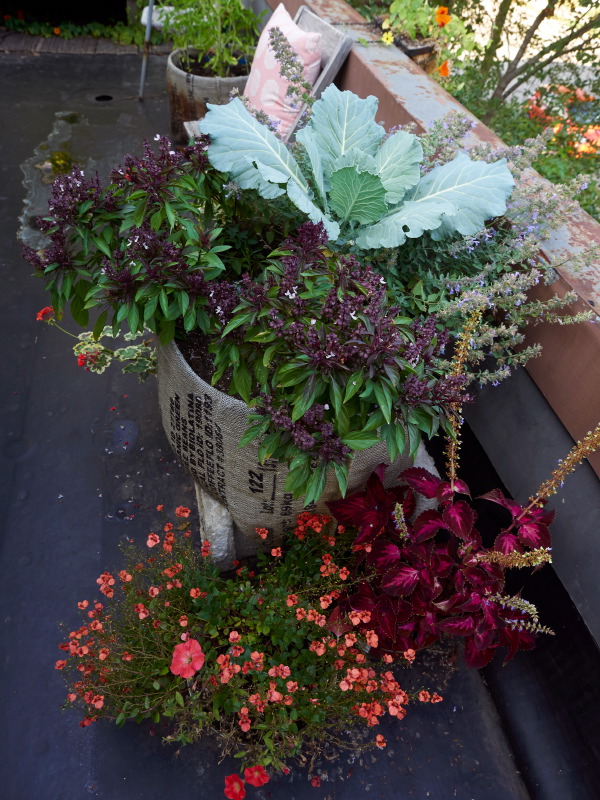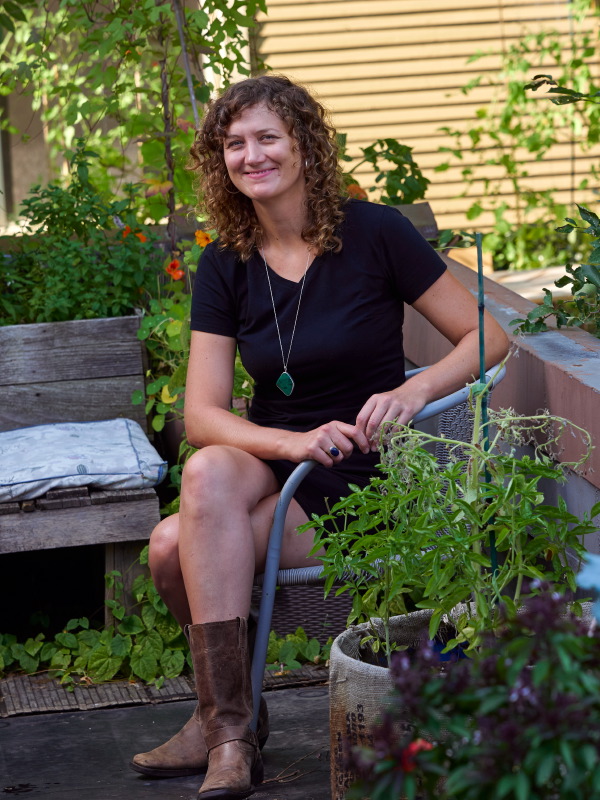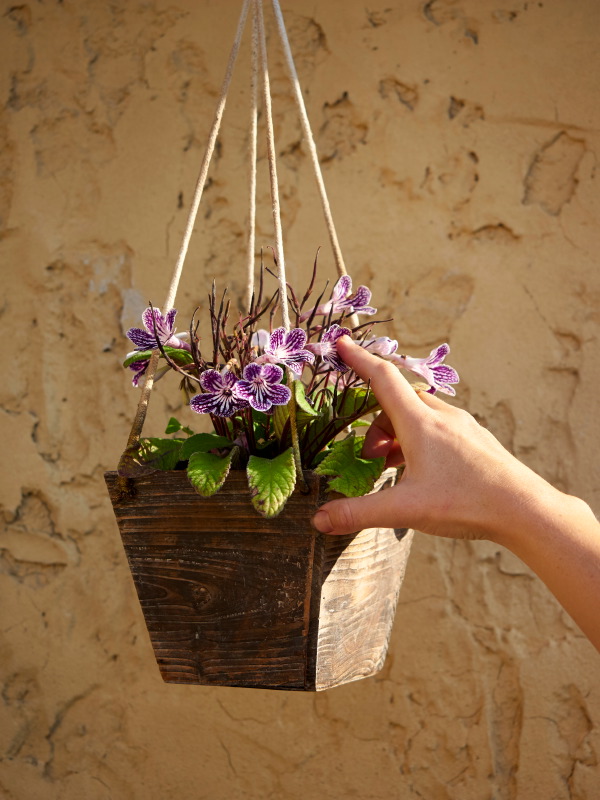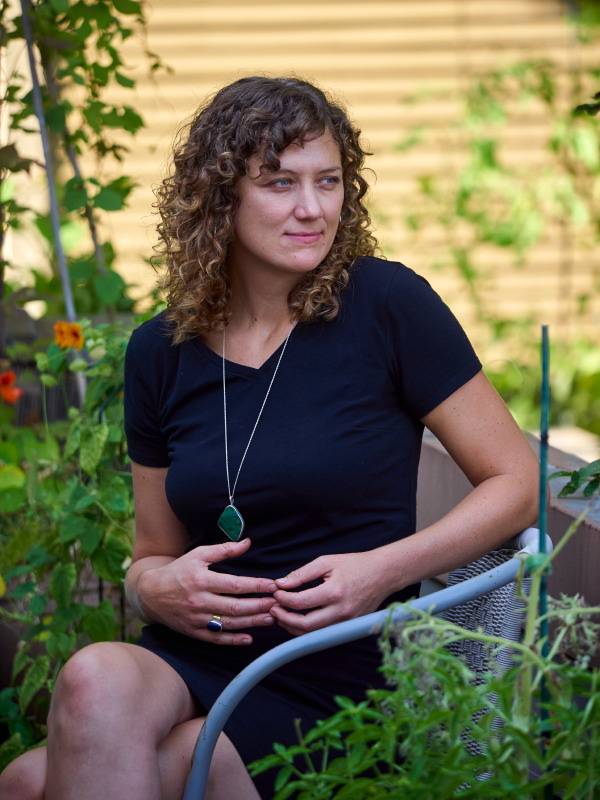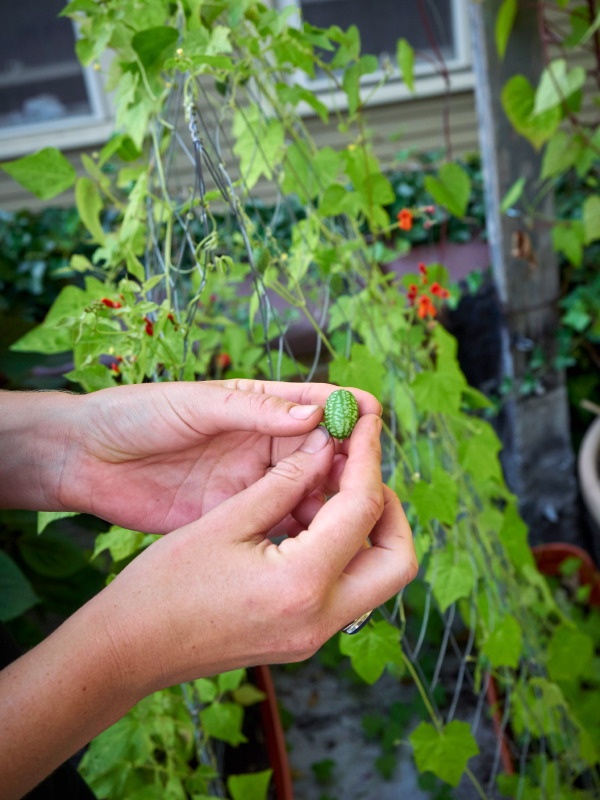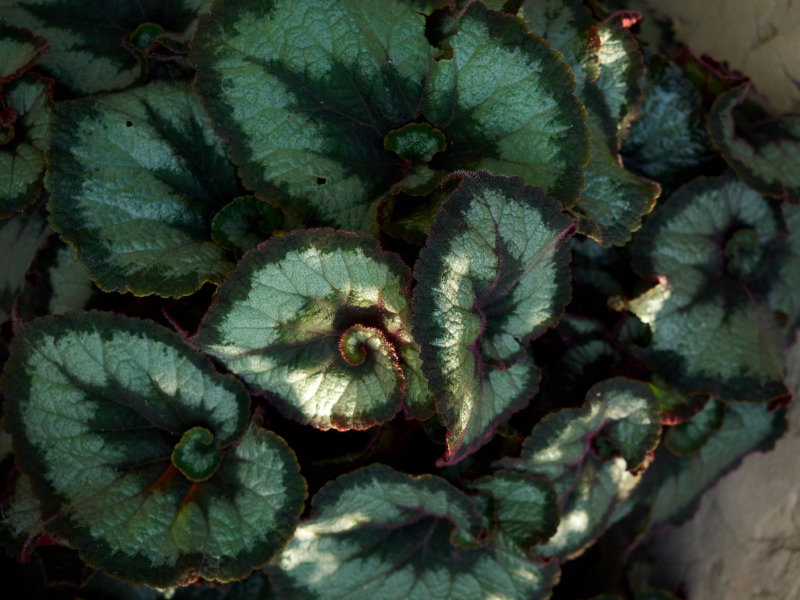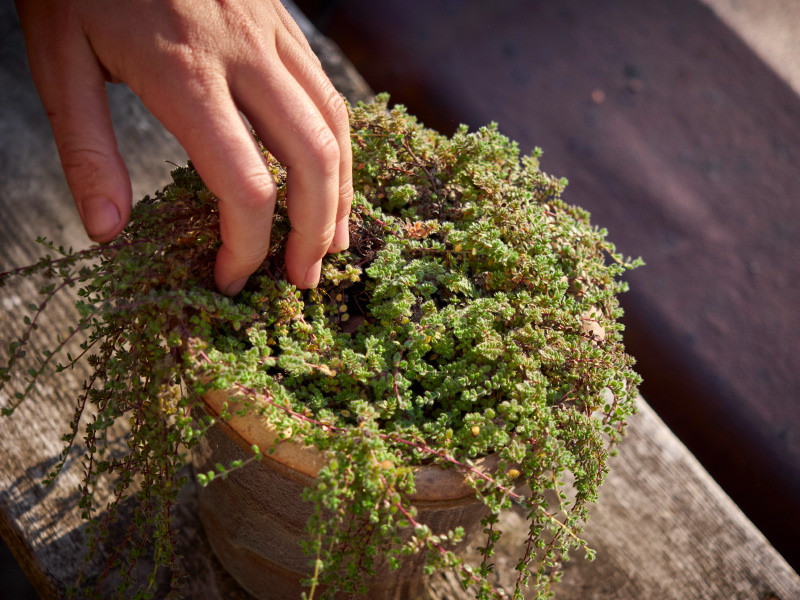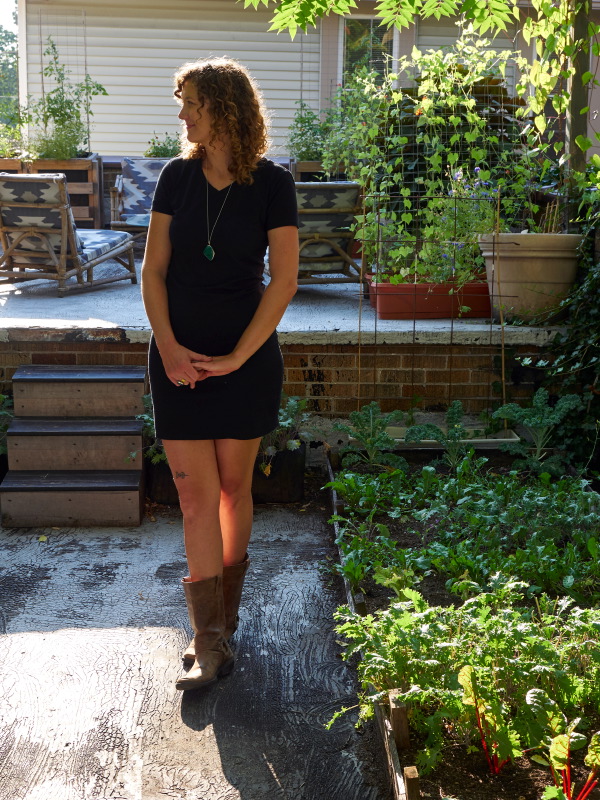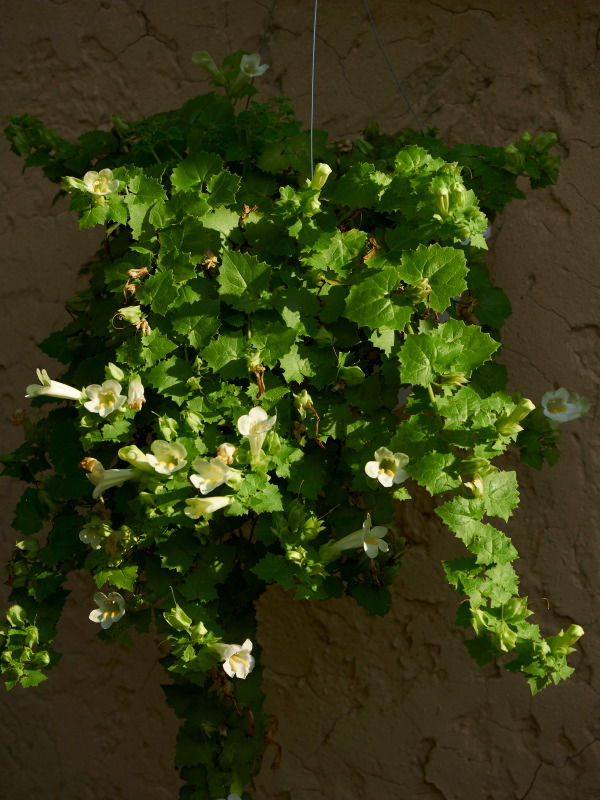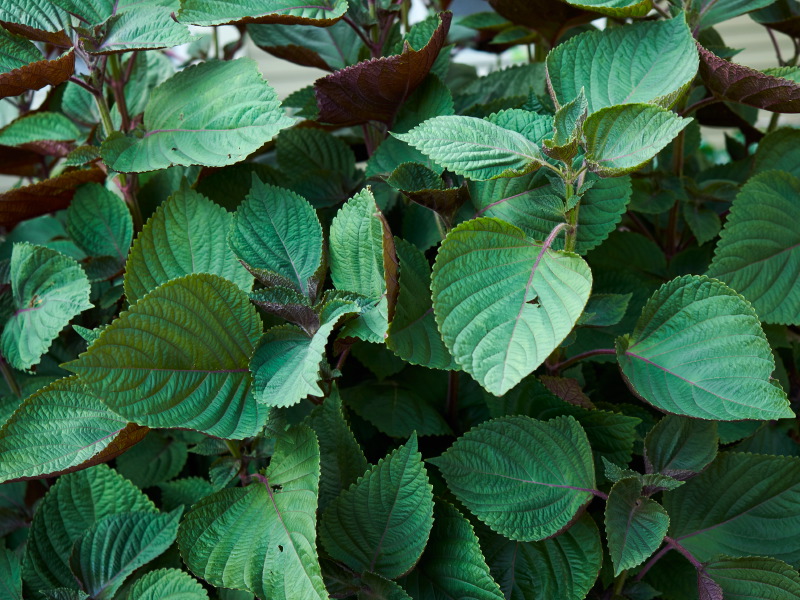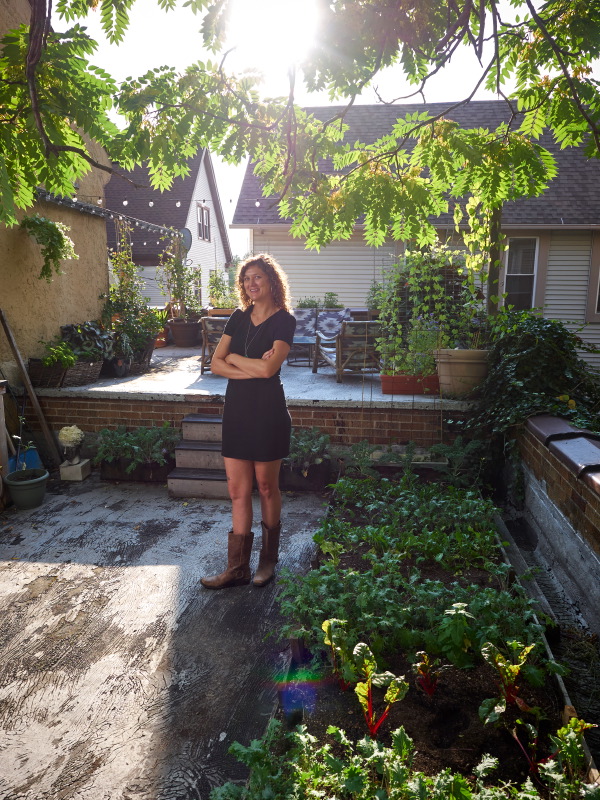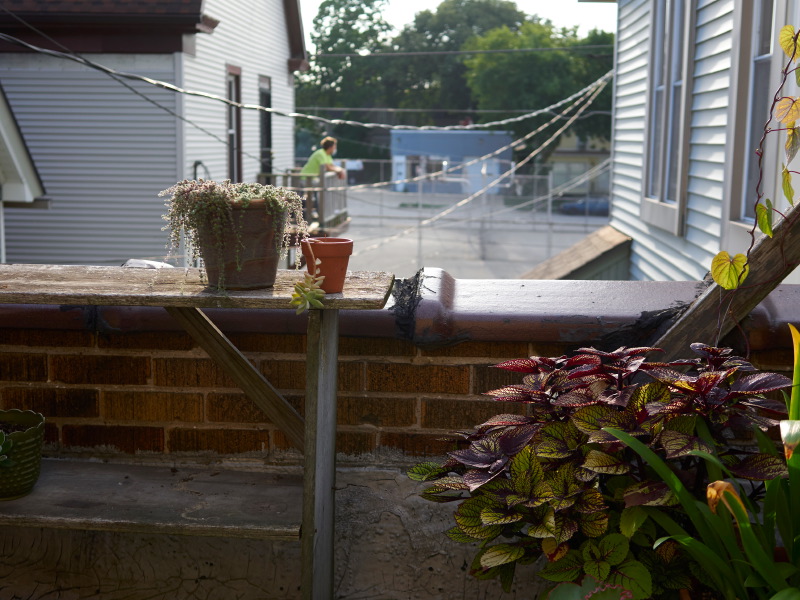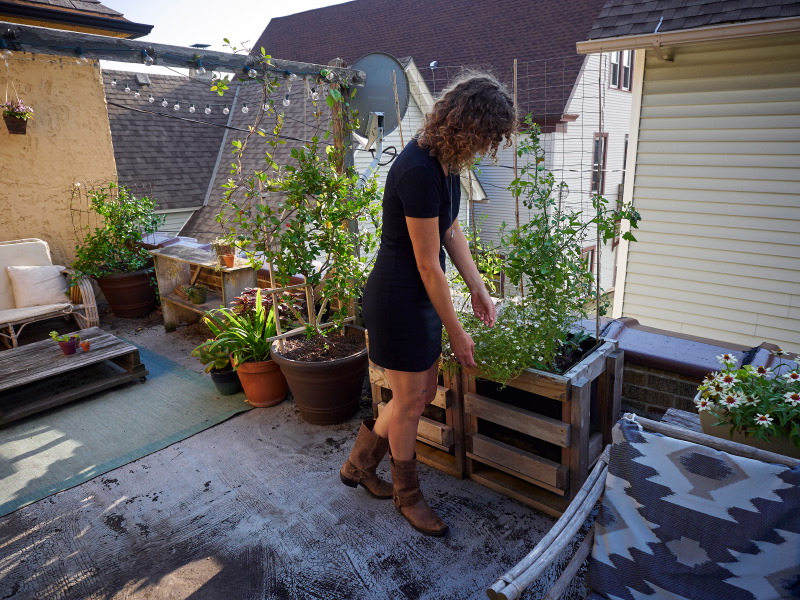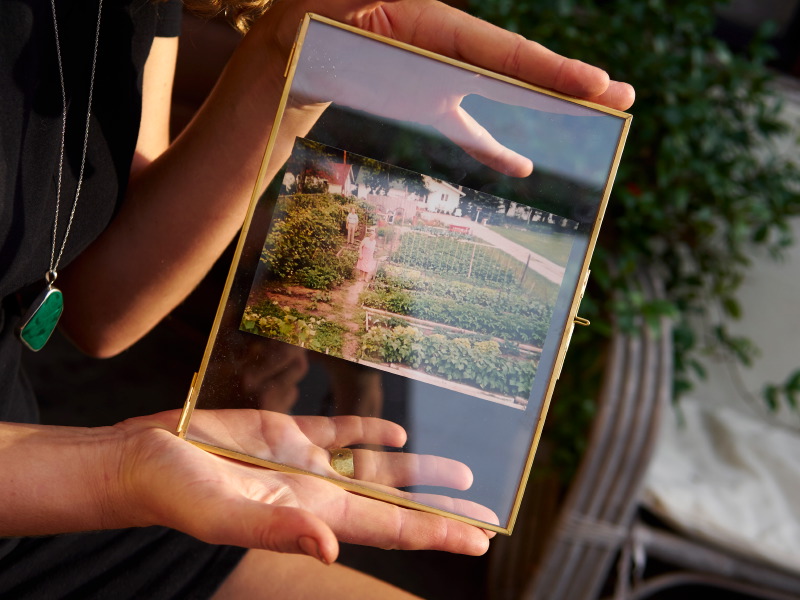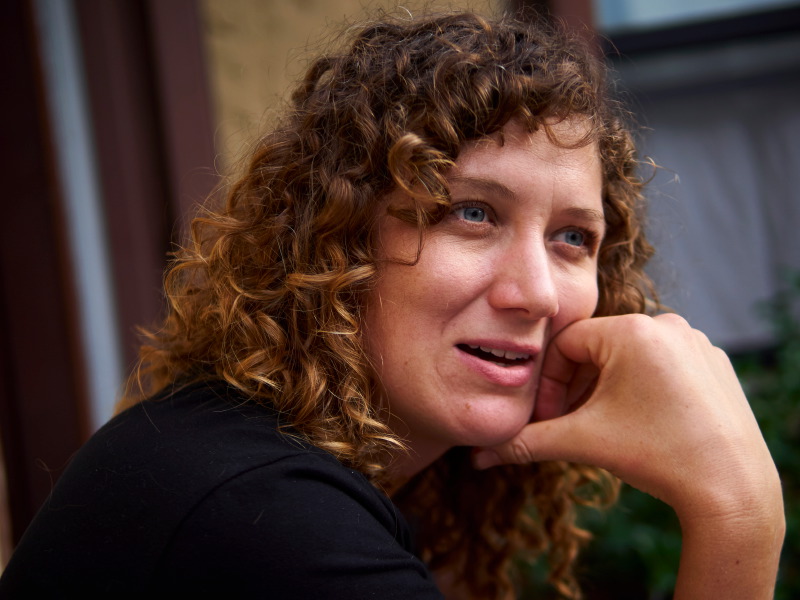Earlier this year, I had the opportunity to photograph the staff of Sustainable Kitchens, a food-consulting firm on Milwaukee’s South Side. SK works with clients to create menus for institutional food services that raise them far above mere “cafeteria food.” While there, I met Charlotte Litjens, a project manager, who mentioned having a large rooftop garden in Riverwest. This sounded neat to me, and I asked to come and visit, to see her garden, and talk about what gardening has meant to her.
I learned a lot about Charlotte, and even more about gardening. Her enthusiasm is inspiring and her experiences and stories made me more interested in trying to see how I can maybe grow more of my food, too!
We started our conversation with a question that I was interested to hear Charlotte respond to, but in no way anticipated how she would answer. I asked her, simply, “who are you?”
“Well, my dad came to this country from Holland, on a cargo ship, when he was 10. His parents and family had been displaced by the Nazis during WWII. Before they left their village, Grandpa buried his copper cookware to hide it from the Nazis…
They thought they were going to New York City, but somehow got sent to Oshkosh instead, and it was soooo cold…it was the middle of January. They made their way, it was better than where they had come from.”
Charlotte’s great-grandparents had been career gardeners at a Dutch castle and that gardening love passed then to her grandparents who were avid gardeners, too. They ended up in Oshkosh, in a cottage by the lake. Her paternal grandparents grew grapes, making wine “which was very strong, I’m told.” They made sauer kraut in their basement; they had apple trees and made applesauce. “They were meticulous gardeners, even when they were in their 90s. That’s where I got my love for home-cooking and gardening,” says Charlotte.
In Oshkosh, Charlotte’s father met his second-wife (Charlotte’s mom) while going through a divorce. They moved in together and began working a garden on a vacant lot. Eventually though, they broke up, …but kept running into each other at the garden, and in time, got back together again!
As an adult, Charlotte had asked her mom, “how did they do it?”, with four kids, and two kids from her dad’s previous marriage. Her mom said they did it for them, the kids: “They did it for us; we had homemade pasta sauce in the freezer, and canned goods, throughout the winter. That was our lifestyle, and their recreation. …all his vacation time was spent on the garden and their home.”
Charlotte went on to tell me about soil prep, about diatomaceous earth (the remains of microscopic organisms from the bottom of the ocean), about compost tea, and how we’re only just starting to understand the “how” behind some of things that people know work well for gardening.
She says of gardening, “It’s a lot of work but that’s what you gotta do. …it’s a special kind of insanity, it’s …why do you wanna be a photographer? It’s cool. It’s cool, right? It’s fun to figure things out? That’s what gardening is, too, “figuring things out.”
She continued, “I think gardening is a way to invite the mind-blowing abundance of life right onto my deck. It’s right HERE. It’s a reward and gratification…every morning, I come out and look, and…the chamomile has re-blossomed, and look at this GIFT. We have so much abundance.”
Charlotte’s passion and gratitude just flows from her:
“You might get to your mid-30s, and life can feel very restrictive…and there’s not a lot of…freedom…it’s just ‘ugh, I gotta work, I gotta make car payments…and this…can’t go on vacation’…and this, this is like WE ARE MILLIONAIRES. I have all these tomatoes; I planted those in MARCH, and every morning, I have this little orange tomato to have with my breakfast, from that tiny little seed.
I can be having a really, really bad day, but then I come out here, and I gotta water the plants, and I gotta carry these cans around, and then ‘oh my gosh, the moonflower is blooming’, and that’s something outside of my control, it’s doing its own thing now…and that keeps me doing it. It’s expensive, it hurts my back, our growing season is too short, but…it’s really fun.
That’s what this is for me – it’s my church. It’s this reminder, “be thankful, we have a lot here.””
There is an ever-expanding awareness of gardening’s value that Charlotte sees, from Growing Power, to the Victory Garden Initiative, to Michelle Obama’s initiatives. And while she thinks a lot of people understand the “why” of gardening, Charlotte thinks people need to work a bit more on the “how.” Not every space is right for every vegetable, and people need to do their homework to figure out what would grow best in their situation, and part of that homework is experimenting, trying out new things. And while it seems that gardening is “counter-culture” at this time, leading many folks to make up their own rules, there are some things that Charlotte wishes people would look at more closely – like lead in the soil, for instance.
It’s not enough to grow in raised beds, she suggests, you really need some sort of barrier at the bottom of the raised beds, like landscaper’s cloth, or even clay.
So while gardeners should listen to good advice from experts, there also should be constant experimenting to find what works best for each person’s growing situation. It’s encouraging to see so much interest in gardening, and Charlotte hopes this will lead to more lateral information-sharing by people, and not just a “top-down” sort of information flow. She points to groups like the UW-Extension and Groundwork MKE as being two great sources of information in the MKE-area.
While growing a garden provides fresh, home-grown food for people, Charlotte knows that it’s impact goes far beyond one garden/one family. Her first job in Milwaukee was at a public charter school, where they did programming to make a garden. She saw impact there, where gardening provided positive alternatives to some of the situations the teens could find themselves in.
“I think gardening brings people together…these teens who lived in the area, they took responsibility for the garden, they made food for themselves and their families; they learned how to prepare the food…three of them, three kids in the same class, all had knife scars from bike thefts, >>from bike thefts<<…they told me, ‘my choices are to work here in the Summer Garden with you (and make a small stipend plus whatever they’d make selling their produce), or selling dime-bags, or guns…”
Going beyond the schools, Charlotte has also seen the effect that community gardens can have on neighborhoods.
“It just takes the tiniest amount of resources…it can solve a lot…a lot of these community gardens give people a reason to get out of their houses, to talk to their neighbors; they might be retired and on a fixed income…it can bring a lot of meaning and enrichment and community in this time of …divisiveness.”
Whether it’s a personal garden, a school garden or community garden, Charlotte has had an impact in Milwaukee. And from Milwaukee, she has gotten the “urban living experience” that she wanted, after having had attended a rural farmers college. Now though, she’s looking for a larger growing situation, larger than a rooftop garden, and that may mean new fields for her in the near future.
